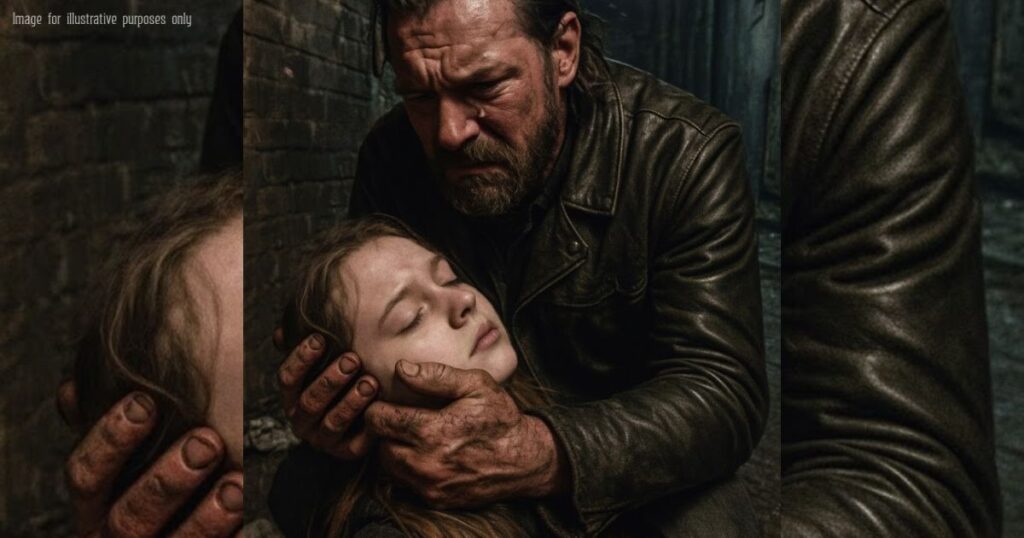The fire got worse. A burning pine tree crashed across the road in front of us.
We didn’t stop, just swerved around it, the flames licking at our boots. Two riders went down on a patch of slick fire-retardant chemicals—they got back up and kept riding, bikes scarred but still running.
Six hours into the ride, just as we started the descent, Wrench suddenly pulled over.
“She’s not breathing,” he yelled, panic finally breaking through his iron control.
Doc rushed over, tearing open his med kit. He pushed a dose of Narcan into her thigh.
We waited, an eternity of silence broken only by the roar of the fire. Then, a gasp. A weak, shuddering breath.
“We need to move faster,” Doc said grimly. “Her heart can’t take much more.”
That’s when a fleet of Forest Service trucks appeared, sirens blaring. They’d heard our chatter on the radio.
They couldn’t officially help, but they could unofficially run interference. “Get behind us!” a ranger shouted. “We’ll clear a path!”
We reformed, Wrench tucked in behind the lead truck, the rest of us flanking. The rangers pushed their rigs harder than was safe, carving a path through the chaos.
The last fifty miles became a convoy of humanity. All were protecting one broken biker carrying the daughter of his sworn enemy.
We roared into the hospital’s emergency bay like an invading army. Wrench was off his bike before it stopped, lifting the girl into his arms and running while nurses rushed out.
“Six hours and twenty-one minutes,” he gasped, handing Lila to the trauma team. “She’s been down for six hours and twenty-one minutes.”
They disappeared inside. Wrench collapsed against a wall, the adrenaline finally leaving him. His hands were burned, his face was a mask of soot, and his body shook uncontrollably.
“You did it,” I said, putting a hand on his shoulder. “You got her here.”
“Now we wait,” he replied, his voice a whisper. “Now we pray.”
Twenty-seven bikers filled that waiting room. They were tough men with tears in their eyes, still covered in ash, praying for a girl none of them should have cared about.
Hours later, a doctor came out, looking exhausted but smiling.
“She’s a fighter,” she said simply. “She’s stabilized. She’s going to live.”
The waiting room erupted. Men were hugging, crying, and clapping each other on the back. Wrench just stood there, frozen.
Just then, Mark Parker burst in, flanked by lawyers. His face was a mixture of relief and disgust as he looked from the doctor to the crowd of bikers.
He walked straight to Wrench. “I don’t know what you think you’ve accomplished,” Parker started, pulling out a checkbook. “But name your price.”
Wrench didn’t say a word. He just held out the crumpled photo of Sean. Parker glanced at it, confused.
“That was my brother,” Wrench said, his voice dangerously quiet. “He was a good kid. Before he got hooked on your company’s ‘miracle’ painkiller.”
The color drained from Parker’s face. The checkbook fell from his hand.
He looked at Wrench, then at the door to the ICU where his daughter lay. For the first time, he saw the full cost of his life’s work.
The next morning, the rains came, dousing the fire and washing the sky clean. In the ICU, Lila Parker opened her eyes. Wrench was there.
When her eyes focused on his tired face, she whispered, “Why?”
“Because everyone deserves a second chance,” he said softly. “Even me.”
The story never went viral, but it changed a town. Mark Parker resigned, liquidated his assets, and used every penny to build “Sean’s Place,” a state-of-the-art rehab and job training center for young addicts.
Today, Lila is two years clean and runs the peer counseling program there. She wants to help other kids who face impossible choices.
And Wrench? He still runs his shop. But now he has a purpose beyond the engine.
He’s the lead mechanic at Sean’s Place. He teaches kids a trade, showing them that their hands can be used to build instead of destroy.
Every year on the anniversary of that ride, the Iron Redeemers lead the “Ride for Redemption,” raising money for Sean’s Place. Hundreds of motorcycles thunder down the clean, healed pass, carrying hope for the kids left in the ashes.
Because one broken biker refused to let a girl die for her father’s sins.
Because twenty-seven riders chose to ride through hell for a stranger.
Because sometimes, hope comes wearing leather and smelling of smoke, carrying redemption in a sidecar, protected against the fire.
Thank you so much for reading this story!
I’d really love to hear your comments and thoughts about this story — your feedback is truly valuable and helps us a lot.
Please leave a comment and share this Facebook post to support the author. Every reaction and review makes a big difference!
This story is a work of fiction created for entertainment and inspirational purposes. While it may draw on real-world themes, all characters, names, and events are imagined. Any resemblance to actual people or situations is purely coincidenta


